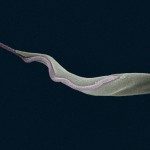Link to Pubmed [PMID] – 3086453
J. Immunol. 1986 Jul;137(1):353-6
The polyclonal B cell responses induced by Trypanosoma cruzi infection last for at least 6 mo after the inoculation of the parasites. In the acute phase of the disease, B cells from spleen and lymph nodes are largely stimulated, whereas a decrease in bone marrow PFC is observed. As the disease progresses, the numbers of Ig-secreting cells in the spleen, lymph nodes, and bone marrow are all enhanced. The isotype distribution of PFC, however, remains unvariable along the course of the infection, and it is characterized by the predominance of IgG2a- and IgG2b-secreting cells. No striking difference in the isotype pattern of resistant and susceptible strains of mice was observed. The continuous and long-lasting B cell stimulation generated during the infection may have important consequences in the pathology of Chagas’ disease.

